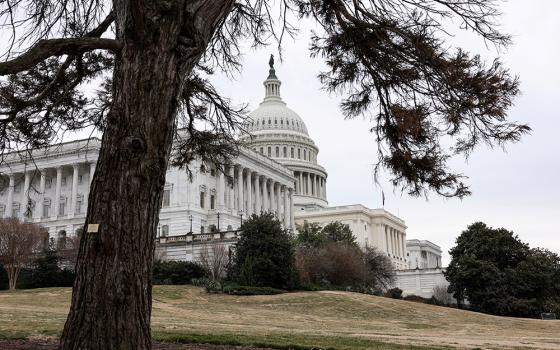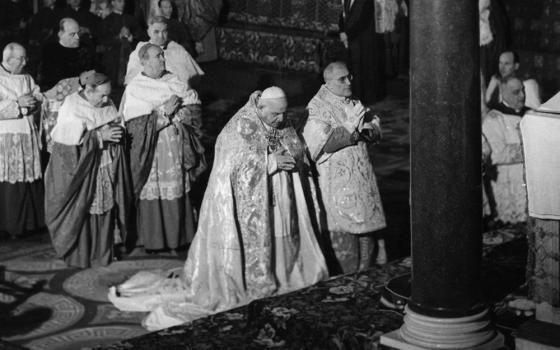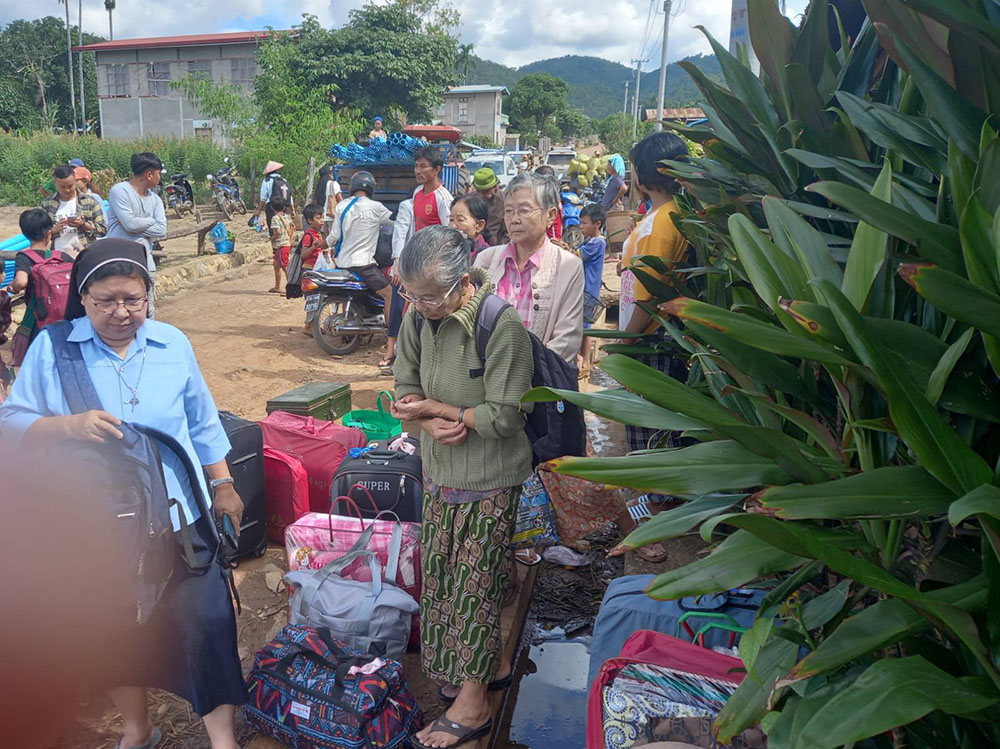
Catholic sisters and others in Loikaw, Myanmar, prepare to leave as the fighting becomes more intense in November. (Courtesy of Sister Florence)
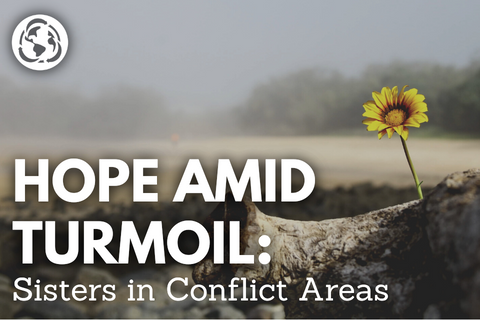
Living in a country of war means living in constant uncertainty and anxiety. In some ways we get used to it, until something happens to keep us alert to danger.
This happened when I went to Loikaw, Myanmar, to visit my parents and our sisters who work there. It was Nov. 6. When I arrived, I decided to do a follow-up visit to one of the participants of our women's program who had lived at the Yangon shelter, escaping from an abusive relationship. She told me, "In life, I was taught to be for others and never listened to myself. I only learned how to take care of myself in the shelter." It was such a blessing to know she is doing well.
Loikaw is one of Myanmar's conflict areas, filled with displaced people from surrounding villages. These families face precarious living conditions, living in tents or other makeshift housing. They are also without critical, life-saving assistance and no one here passes a day without hearing shooting and bombing around the city.
I was enjoying being with my parents, when early Nov. 10 we began hearing artillery shelling. People thought it was just "normal" fighting, but when it continued until 5 a.m. on Nov. 11, we became alarmed.
Intense shelling was coming from Daw U Khu Quarter where our Good Shepherd convent is. Daw U Khu is an area filled with displaced families but also where many government offices are situated and a large prison filled with political prisoners.
At first, we tried to remain calm, but as the shelling continued we all became terrified. We closed all the doors and windows and stayed inside praying the rosary.
Seeing my parents so frightened was heartbreaking, but I knew I needed to be strong for them. But inside I was shaking, asking God, 'When is this war going to end?'
The sisters who were nearby moved to their boarding house with clients because it was a stronger building than the convent. The sisters were also very frightened as this was their first experience of having the fighting so near. As shelling progressed, many of the displaced persons came to the boarding house for shelter.
At first, we could only hear the shelling but in the afternoon, the troops sent a bomb close to our house. We saw it explode, which made us realize how vulnerable we were. We and the sisters thought of moving, but with the increasing bombing, we stayed where we were.
Early on Nov. 13, the sisters decided that everyone needed to move to a safer place. They contacted the Buddhist monastery and the monks agreed to provide shelter for the displaced families. The sisters moved to the home of one of the Good Shepherd Sisters and some to my parents' house.
The conflict, which was between the People's Defense Force and the national military, continued to escalate. The People's Defense Force told us that they chose to fight from our street because it was strategic for fighting the national military and because there were many of their political prisoners held there. The goal of the troops was to turn the entire area to ashes.
We heard the constant sound of planes overhead, and each time they came close I would rush my aging parents to a safe place in the house to hide. We were trapped inside not knowing when it would end.
Advertisement
Seeing my parents so frightened was heartbreaking, but I knew I needed to be strong for them. But inside I was shaking, asking God, "When is this war going to end?"
Nov. 14 was a day of hell for us. Artillery shelling and indiscriminate airstrikes intensified between 6:30 a.m. until midnight. The airstrikes came every 10 minutes and so close, I felt as if the bombs would hit my head and kill me. The house would shake and windows and doors would fly open as bombs fell around us. The house was filled with the smell of weapons going off.
We were caught in the middle between the national military and the People's Defense Force and all we could do was be silent. We could feel the deep silence of fear except for the shelling and airstrikes.
We prayed the rosary over and over, begging Our Lady to save us and for the pilots to have a change of heart — to release the bombs in the lake or field where no people were. But, at 11:40, a bomb exploded right outside my house and we all expected to be killed. My mom kept saying: "I don't want to live in Loikaw anymore and do not want to enter this house again."
Suddenly, we received a message to leave the place as soon as possible for our safety. I had no idea where to go, but my mother and I began packing a few things and we left at 6:30 a.m. We saw the planes coming toward us and we ran to Daw No Ku, a safer quarter.
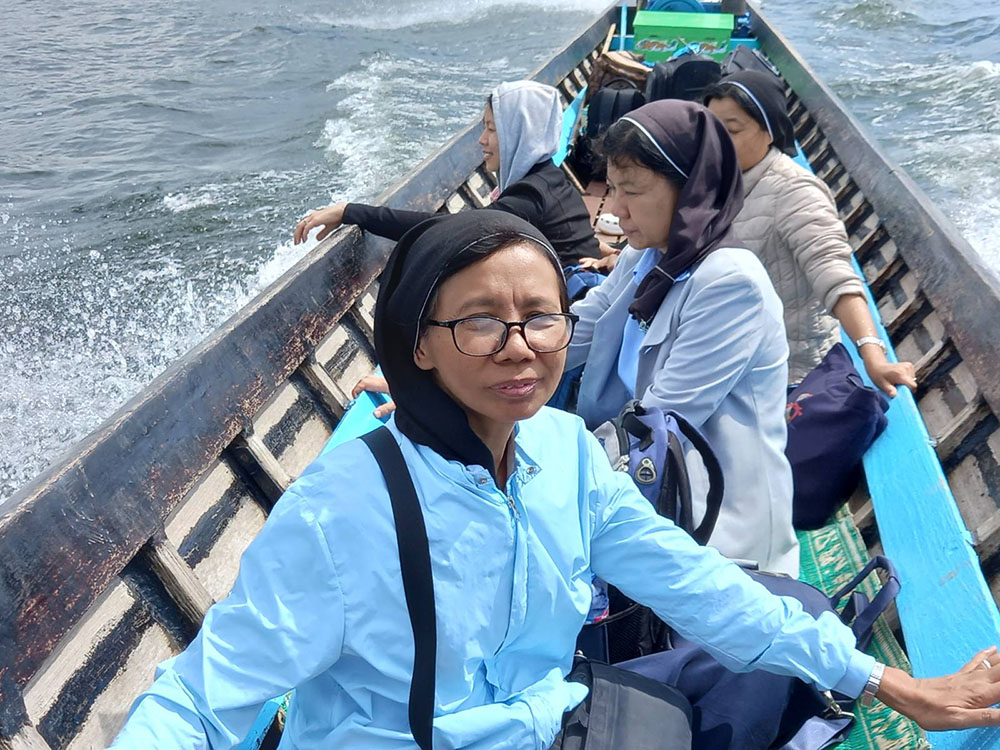
Good Shepherd Sisters use a boat to go to a safer location as fighting becomes more intense in Loikaw, Myanmar, in November. (Courtesy of Sister Florence)
An hour later, the sisters found us and we waited together for rescue. We had no idea how this would happen. About two hours later, two cars appeared to rescue us from Loikaw. One of the sisters along with two priests had arranged for cars to relay us from one place to another.
We changed cars four times. We were the only ones on the road, making it even more frightening. We stayed off main roads and as we looked back we saw everything go on fire with the bombs.
We eventually arrived at the sea and boarded a boat to Pekhon, where we slept overnight before going on to Tauggyi. Checkpoints were frequent and we were asked over and over: "Are you internally displaced?" Technically, we were not and so sad to answer, but they let us pass.
We arrived in Taunggyi, still shaking with fear, but safe. We cannot keep from crying when we hear that the military has blocked all roads out of Loikaw to keep people from fleeing. We lost relatives and friends and cannot even dream what will happen next.
These four days left us traumatized and wondering: Why do these wars continue? This was my first time to experience this national conflict so close and my heart remains heavy thinking about so many people who are trapped in the conflict unable to get free. It is a deeply helpless feeling.





